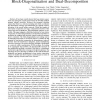Free Online Productivity Tools
i2Speak
i2Symbol
i2OCR
iTex2Img
iWeb2Print
iWeb2Shot
i2Type
iPdf2Split
iPdf2Merge
i2Bopomofo
i2Arabic
i2Style
i2Image
i2PDF
iLatex2Rtf
Sci2ools
119
Voted
GLOBECOM
2008
IEEE
2008
IEEE
Distributed Base Station Cooperation via Block-Diagonalization and Dual-Decomposition
Abstract—It has been recently shown that base station cooperation may yield great capacity improvement in downlink multiple antenna cellular networks. However, the proposed solutions assume that there is a central processing unit which coordinates the information exchange and determines the optimal resource allocation of the overall cellular network. Whilst the benefits of base station cooperation are large, computational burden of the central unit can be significant. Thus distributed solutions are desirable. This paper suggests a distributed solution for base station cooperation via block-diagonalization and dual-decomposition to maximize the weighted sum network capacity under per-antenna power constraint. The block-diagonalization pre-coding matrix is determined separately at each base station. It enables the full potential of base station cooperation by determining a trade-off between inter-cell interference mitigation, spatial multiplexing and macro diversity. The power alloca...
Base Station Cooperation | GLOBECOM 2008 | Inter-cell Interference Mitigation | Spatial Multiplexing | Telecommunications |
Related Content
| Added | 29 May 2010 |
| Updated | 29 May 2010 |
| Type | Conference |
| Year | 2008 |
| Where | GLOBECOM |
| Authors | Yosia Hadisusanto, Lars Thiele, Volker Jungnickel |
Comments (0)

